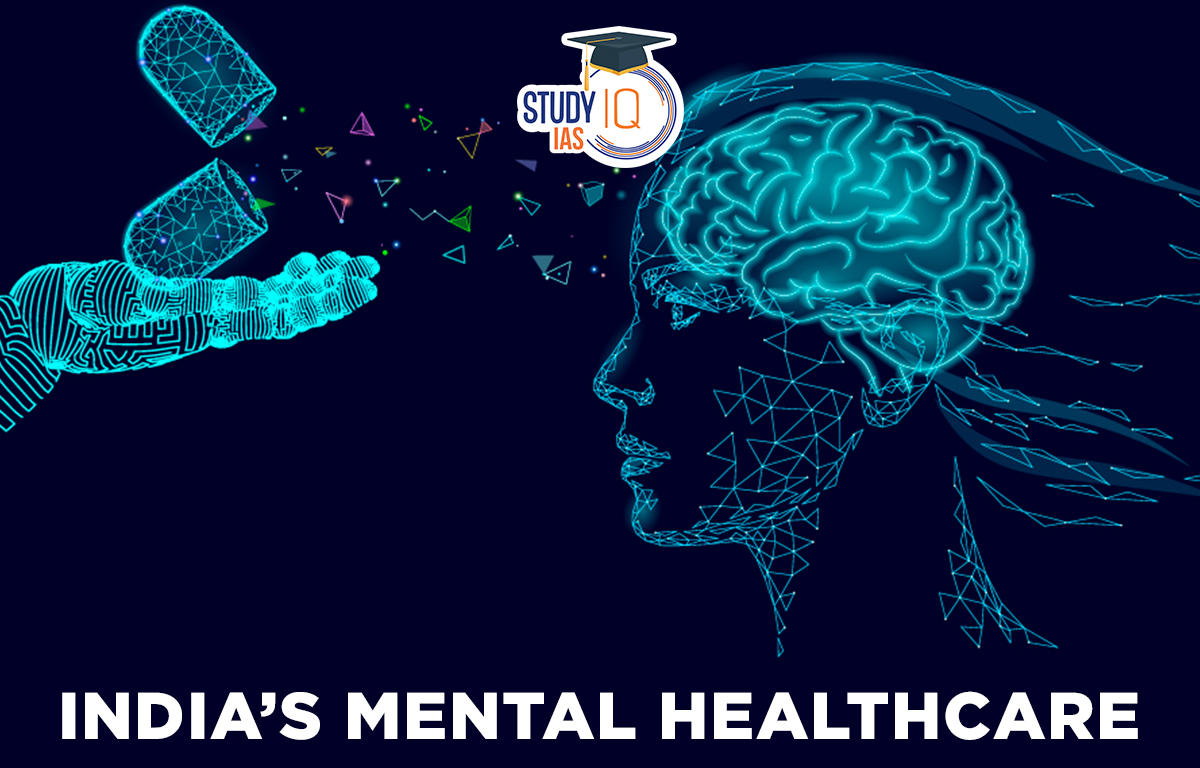Table of Contents
Context: A recent report has suggested improved and better standards of government-run mental healthcare institutions in India.
Report by National Human Rights Commission (NHRC)
- Observations in Report by NHRC were made after visits to all operational government facilities, to assess the implementation of the Mental Healthcare Act, 2017(MHA).
- The report reveals that there is perennial shortage of doctors, lack of infrastructure, and proper amenities.
- Also, the facilities have been “illegally” keeping patients long after their recovery. This was an infringement upon the human rights of mentally ill patients.
- It violates Article 21 of the Indian Constitution which protects personal liberty.
- It also indicates a failure of the State Governments to discharge the obligation under various international Covenants such as the United Nations Convention on the Rights of Persons with Disabilities (UNCRPD).
United Nations Convention on the Rights of Persons with Disabilities (UNCRPD)
- It is an international human rights treaty of UN which recognizes, protects, and supports the rights of persons with disabilities.
- The UNCRPD applies to persons with mental illness and psycho-social disabilities thus recognizing that mental illness when accompanied by social barriers, makes people with mental illness a vulnerable group.
- India ratified it in 2007 which meant making a binding commitment to ensure all our laws are in compliance with UNCRPD.
The Mental Healthcare Act, 2017
- Replaced 1987 Act: India realized that the Mental Health Act, 1987 was not in congruence with the UNCRPD and thus, decided to replace it with a new law, i.e the Mental Healthcare Act, 2017.
- Mental Illness: According to 2017 Act, “mental illness means a substantial disorder of thinking, mood, perception, orientation or memory that grossly impairs judgment, behaviour, capacity to recognise reality or ability to meet the ordinary demands of life, mental conditions associated with the abuse of alcohol and drugs.
- Right to Access Healthcare Facilities: This Act safeguards the patients’ right to access a range of mental healthcare facilities such as inpatient and outpatient services; rehabilitation services in the hospital, community, and home; halfway homes; sheltered accommodation; and supported accommodation.
- Discourages Physical Restraints: The Act also discourages using physical restraints such as chaining, objects to unmodified electro-convulsive therapy (ECT).
- Regulation on Research: It regulates the research on PMI (Person with Mental Illness) and the use of neurosurgical treatments.
- Rights Under the Act:
- Right to Make an Advance Directive (Patient can state on how to be treated or not to be treated for the illness during a mental health situation).
- Right to Access to Healthcare Services.
- Right to free of cost healthcare services.
- Right to live in a community.
- Right to protection from cruel, inhuman and degrading treatment.
- Right not to be treated under prohibited treatment.
- Right to equality and non-discrimination.
- Right to information.
- Right to confidentiality.
- Right to legal aid and complain.
- Decriminalizes Suicide Attempt: The Act states that any person who attempts to commit suicide shall be presumed, unless proved otherwise, to have severe stress and shall not be tried and punished under the Indian Penal Code.
- Establishment of Authorities: The Act envisages the establishment of Central Mental Health Authority and State Mental Health Authority.

The Mental Healthcare Act, 1987
- Institutionalisation of Mentally-ill People: MHA’s predecessor, the Mental Healthcare Act, 1987, prioritised the institutionalisation of mentally-ill people and did not afford any rights to the patient.
- Disproportionate Authority: This Act provided disproportionate authority to judicial officers and mental health establishments to authorise long-stay admissions often against the informed consent and wishes of the individual.
- As a result, several persons continued to be admitted and languish in mental health establishments against their will.
- Indian Lunacy Act of 1912: The 1987 Act embodied the ethos of the colonial-era Indian Lunacy Act of 1912, which linked criminality and madness.
- Asylums were places where “abnormal” and “unproductive” behaviour was studied as an individual phenomenon, isolating the individual from society. The intervention was meant to correct an inherent deficit or “abnormality”, thereby leading to “recovery”.
- Curtailed Liberty: The 1987 Act curtailed the liberty of mentally ill individuals which was a major disregard to human rights, it did not provide any relief to patients on rehabilitation and treatment plans after their discharge from hospitals.
- It also failed to take into consideration the financial, social, or emotional burdens to the patients as well as their caregivers.
Challenges in Implementation of The Act
- Absence of Mental Health Review Boards: The majority of the States have not established State Mental Health Authority and Mental Health Review Boards (MHRBs), and many States have not notified minimum standards which are meant to ensure the quality of mental health establishments.
- MMHRBs are bodies that can draft standards for mental healthcare institutes, oversee their functioning and ensure they comply with the Act.
- The absence of MHRBs renders people unable to exercise rights or seek redressal in case of rights violations.
- Poor Budgetary Allocation: Poor budgetary allocation and utilization of funds further creates a scenario where shelter homes remain underequipped, establishments are understaffed, and professionals and service providers are not adequately trained to deliver mental healthcare.
- Stigma: People are either put in these establishments by families or through the police and judiciary.
- In many cases, families refuse to take them because of the stigma attached to incarceration or the idea that the person is no longer functional in society.
- Gender discrimination plays a role here: women are more likely to be abandoned due to family disruption, marital discords and violence in intimate relationships.
- Lack of Community Based Services: While Section 19 recognises the right of people to “live in, be part of, and not be segregated from society,” there have been no concrete efforts towards implementation.


 SSC Stenographer 2024 Notification Out a...
SSC Stenographer 2024 Notification Out a...
 IB SA MTS Final Result 2024 Out at mha.g...
IB SA MTS Final Result 2024 Out at mha.g...
 Model Skill Loan Scheme, Eligibility, Re...
Model Skill Loan Scheme, Eligibility, Re...

















